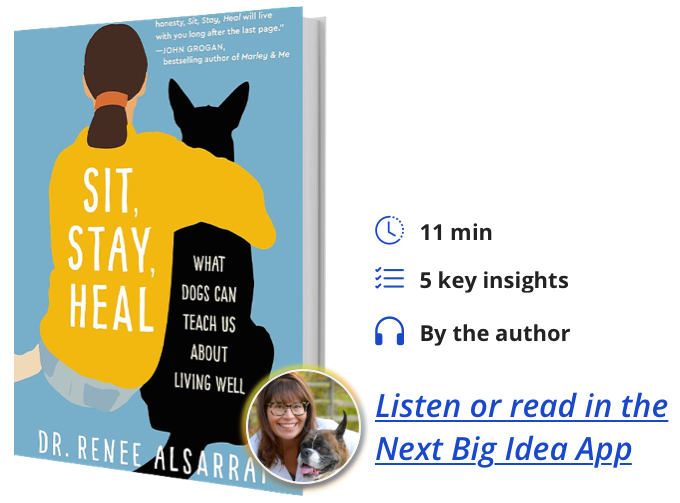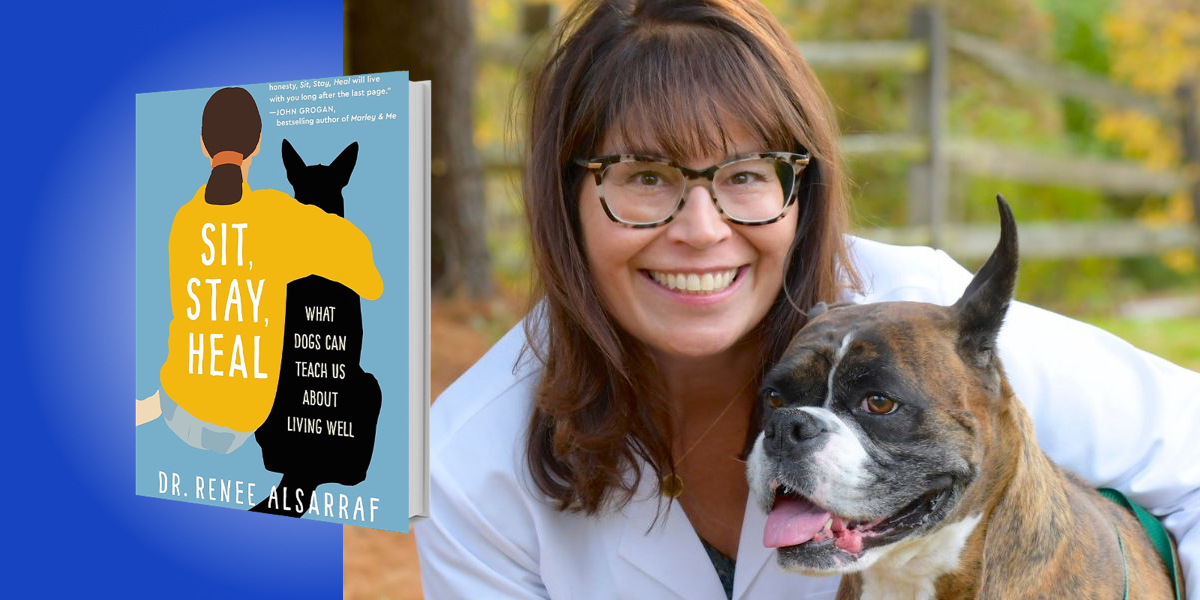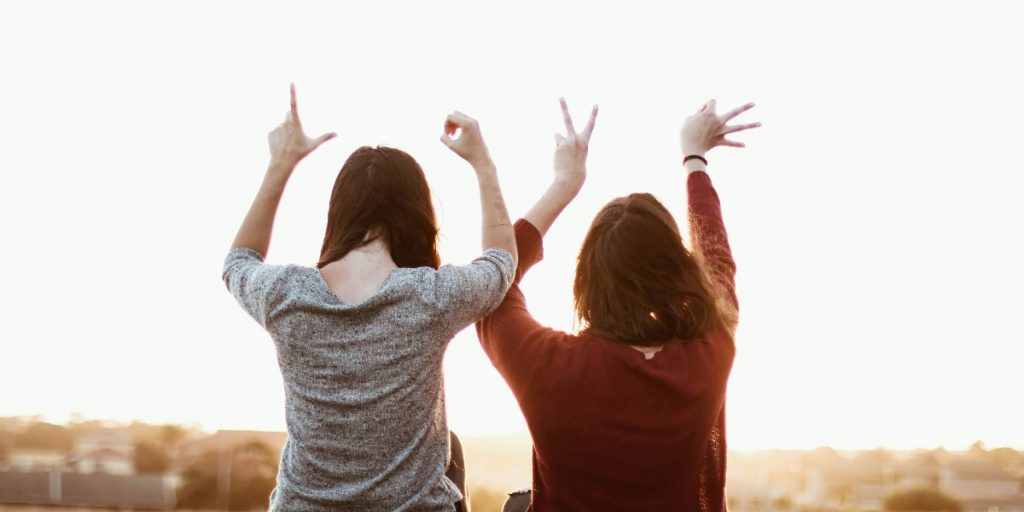A board-certified veterinary medical oncologist, Dr. Renee Alsaraff created four medical oncology practices and three radiation centers for animals. She has been in private practice for 30 years. Currently, Renee works as a consultant for PetCure Oncology. She has brought her therapy dogs to nursing homes, helped special needs children ride horseback, competed in obedience trials with her boxers and created MSU’s Pet Loss Support Group.
Below, Renee shares 5 key insights from her new book, Sit, Stay, Heal: What Dogs Can Teach Us About Living Well. Listen to the audio version—read by Renee herself—in the Next Big Idea App.

1. With dogs, there is no judgement.
Plain and simple, dogs meet us wherever we’re at. We all have periods in our lives where it’s hard to face another person, where we might be embarrassed by a misstep or by something we’ve said. But our furry friends never judge us. Sure, dogs experience a wide array of feelings—happiness, sadness, excitement, fear—but their stares are never judgmental.
They accept us, they don’t jump to conclusions, nor do they put us down. I know my dog looked at me adoringly despite my straggly chemo hair plastered to my head, and the pajamas that I was wearing for four straight days. I was a whole person in his eyes, which gave me courage and strength to battle on. Bentley, a beagle featured in the book, saw past his pet parents’ crabbiness, understanding where his “dad” was at.
Dogs possess this magical ability to see us for who we are more than any one person can see us. It is human nature for people to judge each other, but we’re all better off if we don’t. Instead of knocking us down, dogs make us feel seen, make us feel loved. To be loved unconditionally, without judgement, is the best feeling around.
“Dogs possess this magical ability to see us for who we are more than any one person can see us.”
I think if we could impart more of that to ourselves, we’d all be better off. I have this voice inside my head and sometimes she can be pretty nasty to me. Dogs don’t have that. There is no twisted, harsh critic in them. Let’s have dogs remind us to quiet that voice within us.
2. The benefit of being a pack animal.
Dogs are pack animals. In the wild, dogs survive because they exist in a pack. Each has a role within the group. But they function better because they are together. They help each other obtain food, they rely on each other for safety, they lay on each other for warmth and security—it’s as if dogs are their own weighted blanket.
Dogs genetically have evolved to be in our pack. I’m better off for having my dog. My boxer, Newton, provided unbridled love when the world seemed too harsh. He was my diligent nursemaid who never left my side.
Dogs, such as Daisy the cocker spaniel, give independence to people with special needs Franny, the bloodhound, aids police in search and rescue. The sum of Franny’s and her police partner’s work far exceeds what the two individuals can accomplish alone. I’d like to suggest we take this concept out a little further, that we as people are better off as a pack rather than as individuals acting alone. In a pack, we do better supporting each other and lifting one another up. Dogs show us that working and living together improves all of our lives.
3. Dogs practice mindfulness.
Dogs live in the moment. They don’t fret about what might happen nor do they stew about what happened in the past. Fretting wastes energy. Sadly, I can fret with the best of them. But when has that ever really helped? Using my dog patients as my guide, I realize they don’t worry. They don’t try to control the uncontrollable. Our furry friends face life and each obstacle head on. They don’t fret before chemo, they don’t get upset after chemotherapy is done. And that helps their healing process.
“Canines model the sanctity of self-care.”
My dog patients set the bar higher for me. They were my cancer recovery role models. Despite long-term consequences, Bentley the beagle never worried about his or his pet parents’ combined mortality. Bentley took each day as it came and was happy just the same. We struggle to remain alive yet waste our living time, worried about the what-ifs.
Canines model the sanctity of self-care: they sleep when they need to, they don’t push themselves needlessly, they even lick their own wounds. I wasn’t nearly that wise. Even though I was sick, I still insisted on forging ahead and tackling my to-do list. By living in the moment, dogs mirror for us a healthy, take-life-as-it-comes approach.
4. Dogs celebrate imperfections.
People often feel whole in the presence of animals. Dogs don’t care if our hair is a bit gray or if we have gained Covid weight. And as dogs age, they sometimes develop lumps, fatty lipomas and warts, even become gray around their muzzle, yet we love our dogs just the same. Sadly, we don’t extend the same love to ourselves.
With dogs, we can be who we really are with them. No false pretense, no insecurities. Franny, an older bloodhound, loved herself despite her wrinkles, endless drool, and gaining fifty pounds during her cancer treatment! She lumbers when she walks. Yet when I was sick, I had a pity party for myself for gaining weight from my treatment, overlooking the fact that I am alive. I was wasting the present not being happy. We should celebrate ourselves despite the dents we get along the way. And we should love each other as well.
5. Dogs model what a best friend should be.
Steadfast, loving, loyal, protective, unbridled companions with unconditional love. Coveted qualities you hope for in a friend. Dogs possess all these attributes and more. Our lives are so much better with them by our side. In fact, the word “pet” seems inadequate. They’re special beings. We’re not their owners, we’re their partners in life.
“Though the girl is unable to speak, Daisy knows what she is saying.”
Dogs don’t see our disabilities. Daisy, the cocker spaniel, never leaves the side of the family’s special needs child. Though the girl is unable to speak, Daisy knows what she is saying. With no training whatsoever, Daisy became a seizure-alert dog, warning the family just before the girl would go into an epileptic episode.
Newton, my boxer, was my companion while I convalesced after my medical treatments, never letting me feel alone. Not once did he complain about his own issues dealing with his cancer. Not once did he miss a game of hoops with my son. He showed up for my family.
The human-animal bond is a mutual relationship based on trust. Dogs understand us better than anyone else. Though we are responsible for them, they feel they are 100 percent responsible for us. They have a sixth sense to understand us at a much deeper level, more than we even understand each other. They have our backs. They are our best friend…and I would say they are the best friend a girl could ever ask for.
To listen to the audio version read by author Renee Aslarraf, download the Next Big Idea App today:































